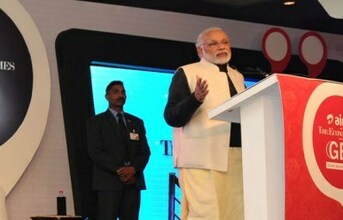
Let me turn to the second aspect — improving opportunities. I believe in the politics of empowerment. I believe in empowering the people to improve their own lives. We undertook the world's largest and most successful financial inclusion programme.
It has brought over two hundred million unbanked people into the banking system. In the early days of this programme, sceptics felt that these accounts would have no balances. You will be surprised to know that today these accounts have a balance exceeding Rs. thirty thousand crores or over four billion dollars. We have also issued a record number of debit cards to them. India is now one of the few countries where the market share of an indigenous credit card brand exceeds 33%.
We have introduced a new and comprehensive program of crop insurance. This empowers farmers to give their best, with the State providing cover against risks beyond the farmer's control.
We have introduced soil health cards to empower our farmers. The card will tell every farmer the exact character of his soil. This will enable him to increase crop yield, reduce over-use of chemical inputs and fertilizer and restore soil health.
Entrepreneurship is one of India's traditional strengths. It was sad to see it neglected in the last few years. "Business" and "profits" had become bad words. We have changed that. We need to value enterprise and hard work, not wealth.
Our programs ranging from MUDRA to Start Up India and Stand-Up India provide opportunity to the hard working and to the enterprising. In so doing, we have placed special emphasis on Scheduled Castes, Scheduled Tribes, Other Backward Classes and women. We are empowering them to become masters of their own destinies.
Creating opportunities for cities and towns to grow is very crucial. Urban areas are an engine of growth. A key initiative for urban transformation is the Smart City Mission. The Mission has several ‘firsts'. It is the first time that certain areas in cities will be comprehensively developed in a systematic and qualitative way.
These areas will act as ‘light houses' which will eventually influence the rest of the city. It is the first time that there has been such extensive citizen consultation. Nearly 2.5 million people participated through contests, discussions, polls, blogs and talks on the MyGov platform. This is a major break from the top-down approach to urban planning. It is the first time that allocation of funds in a government scheme is done not by decisions of Ministers or officers but on the basis of competition. This is a good example of competitive and cooperative federalism.
As I mentioned earlier, the role of a Government does not end with the economy alone. There are many non-economic dimensions which are vital for ensuring the welfare of the citizens. Good governance is crucial. We have taken numerous steps which have transformative potential. We have ended the era of high level corruption.
This is a fact acknowledged by Indians and foreigners, and by critics and supporters of this Government. This is not an easy achievement. We have ended political interference and crony capitalism in nationalized banks. We have for the first time appointed several heads of public sector banks from the private sector. Transparent auctions have cleaned up the natural resources sector which was riddled with scandals.
(Continued on the next page)


























